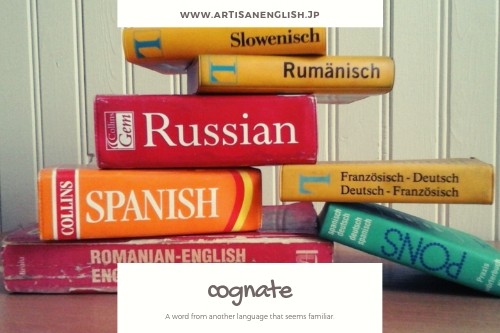
YouTube / iTunes / Spotify / Radio Public / Pocket Casts / Google Podcasts / Breaker / Overcast
Listen to ArtisanEnglish.jp posts & lesson intros here.
Word of the Day: Cognate
OK, everyone, let’s do a little bit of grammar today, shall we? Let’s look at the word cognate.
C’mon now, before you begin to groan and move on to something more enjoyable, why not make this the one thing you learn today?
Are you still with me on this?
Yes, OK, here we go.
Cognates are words in different languages that are very similar in appearance or sound.
Let me give a few examples.
If we take the German and English languages, we have the German buch and the English book.
Between English and Spanish, we have family vs famalia.
Between French and English, there are hundreds of cognates.
Seeing as how Halloween was not long ago, we could start with the French horreur, which looks very similar to the English word horror.
We also have débat in French, which means debate in English.
Then we have liberté, qualité and Anglais in French and their English counterparts liberty, quality and English.
When learning another language, these words are a quick and easy way to increase your vocabulary.
It’s like enjoying the benefits of cheating without the stigma of being dishonest.
Unfortunately, cognates don’t always have the same meaning.
The French word manger means to eat, but the English word manger means a box which holds food for animals.
Yes, they both have to do with eating, but not precisely in the same way.
There are three types of cognates
1) Words that have the same spelling.
2) Words that have similar spelling.
3) Words that have the same sound.
For English speakers learning Japanese, there are many cognates, such as mouse (マウス), grey (グレー), or blanket (ブランケット).
They sound similar, but the katakana spelling looks nothing like the English.
Many English speakers can take comfort that if a Japanese says, “私のブランケットの中にグレーのマウスがいます,” they will get the gist of the sentence.
But why there is a grey mouse in their blanket would still be a mystery.
Flesch-Kincaid Readability Test
This post is understandable by someone with at least a 7th-grade education (age 12).
On the Flesch-Kincaid reading-ease test, this post scores 75.
The easier a passage is to read, the higher the score on a scale of 0 – 100.

